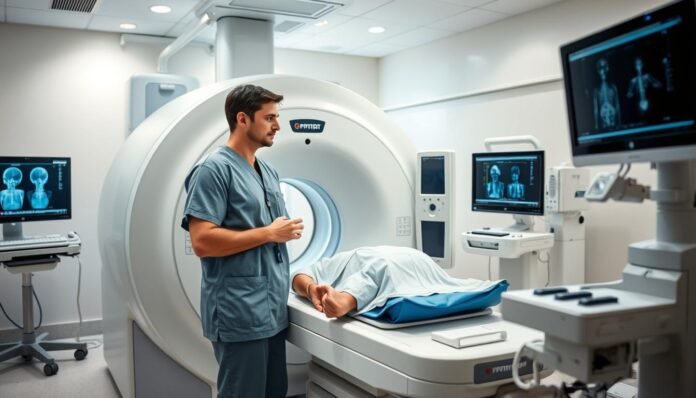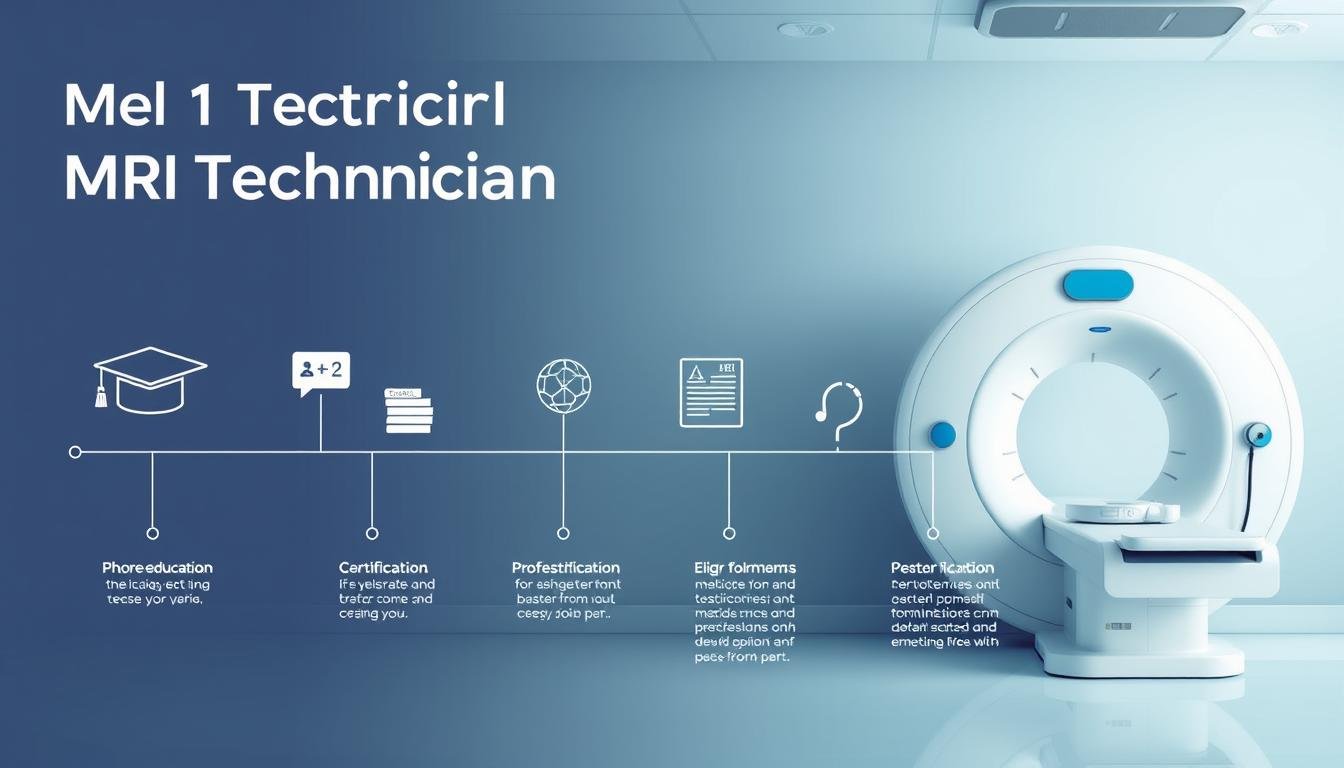Want to be an MRI technician? It’s an exciting job in healthcare. MRI techs help diagnose and monitor many medical conditions.
This guide will show you how to become an MRI tech. We’ll cover education, training, and ways to grow your career.
A focused MRI technician in a modern hospital setting operates an MRI machine with a patient on the examination table. Surrounded by advanced medical equipment and monitors, the technician showcases a sterile environment, attention to detail in the technician’s scrubs and high-tech machinery, and bright clinical lighting, emphasizing professionalism and care in the field of medical imaging.
MRI techs need clinical skills and technical know-how. They run complex machines and take clear pictures.
These pros also help doctors make the correct diagnoses. If you like healthcare and tech, this job might be perfect for you.
Understanding the Role of an MRI Tech
MRI technologists operate advanced medical imaging equipment. They provide top-notch patient care while conducting magnetic resonance imaging scans.
These professionals work in hospitals, imaging centers, and outpatient clinics. They collaborate with radiologists and other healthcare experts to provide accurate care.
MRI techs carefully position patients and set up equipment. They also monitor patients closely during the scanning process.
Patient safety is the top concern for MRI technologists. They screen for risks like metal implants or pacemakers.
MRI techs give clear instructions to ensure patient comfort. Their expertise helps diagnose various health conditions effectively.
These professionals are crucial in treating neurological and musculoskeletal issues. Their skills and teamwork make them vital to healthcare teams.
Educational Requirements for MRI Technicians
MRI techs need special training to work with Magnetic Resonance Imaging machines. They can get an associate’s or bachelor’s degree to learn the skills.
An associate’s degree in MRI technology is a typical two-year program. It teaches MRI basics, patient care, and equipment use.
Another choice is a bachelor’s degree in radiologic sciences with an MRI focus. This four-year program covers more topics and may lead to better jobs.
Both degrees include hands-on practice in hospitals. Students learn to use MRI machines and keep patients safe.
Many programs prepare students for the ARRT certification exam, which is important for MRI technicians to get jobs.
Accreditation and Certification for MRI Techs
MRI technicians need special education and training. Accredited programs follow strict standards set by organizations like JRCERT.
MRI techs must get certified by the ARRT. The ARRT exam tests knowledge of patient care and safety.
Passing this exam proves the tech’s skills. It’s needed for jobs in most healthcare places.
ARRT certification requires ongoing education. MRI techs must complete 24 credit hours every two years.
This keeps them updated on new MRI tech and care. Good training helps techs give safe, quality care.
Essential Skills for MRI Technicians
MRI technicians need unique skills beyond technical know-how. They must operate equipment precisely and communicate well with patients.
MRI tech skills are crucial. Technicians must understand the equipment and its functions thoroughly.
They need to position patients correctly. Adjusting settings and monitoring scans are key for quality images.
Patient communication is vital. Technicians must explain procedures clearly and ease patients’ fears.
A suitable bedside manner improves the overall experience. Clear instructions help patients cooperate during scans.
Technical proficiency is essential. Technicians must quickly solve problems during scans.
They need to handle unexpected situations well. This ensures smooth scans and accurate diagnostic information.
Steps to Become an MRI Tech
Starting an MRI tech career is exciting and rewarding. It begins with earning an associate’s degree in radiologic technology.
Students learn about human anatomy, physics, and the operation of MRI equipment, gaining knowledge that will help them excel in this field.
After education, aspiring MRI techs must pass the ARRT certification exam. This test covers MRI procedures, patient care, and safety protocols.
Certified MRI techs then gain hands-on experience through internships or clinical rotations. They apply their knowledge and develop essential skills for MRI scans.
This is a visual representation of the career path for an MRI technician. It features a timeline with key milestones, such as education, certification, and professional development, illustrated with symbolic imagery like a graduation cap, MRI machine, and stethoscope. The image is set against a serene medical environment with soft colors and a sense of progression.
Continuing education helps MRI techs grow in their careers. Attending conferences and earning advanced certifications can boost their prospects.
Staying current with industry trends improves patient care. MRI techs can provide top-notch service by updating their skills.
Career Advancement Opportunities
MRI technicians have exciting career growth options. One option is to specialize in specific imaging techniques or body areas.
You could focus on cardiovascular, neurological, or musculoskeletal MRI. These specializations can lead to advanced skills and new opportunities.
Another route is moving into radiology management. With more experience, you can lead imaging departments or centers.
You’d oversee staff, budgets, and daily operations. This path suits those interested in leadership roles.
Becoming a lead MRI technician is also possible. You’d perform imaging and train new staff members.
You’d also manage schedules and ensure high-quality work. This role can lead to senior positions.
Continuous learning is key to career growth. Stay updated on new technologies and techniques.
This knowledge can open doors to new opportunities. It helps you advance in the radiology field.
Job Outlook and Salary Information
MRI technicians have a bright future in the job market. The healthcare industry is growing fast due to an aging population.
The U.S. Bureau of Labor Statistics predicts 7% job growth for MRI techs, which is faster than the average for all jobs.
MRI techs earn a median yearly salary of $73,820, and the top 10 percent can make over $94,000.
Pay varies based on location, experience, and workplace. Big cities and special imaging centers often pay more.
MRI tech careers are attractive due to high demand and good pay. The growing medical field offers excellent prospects for new professionals.
Finding Job Opportunities
Launching your MRI tech career requires innovative job search strategies. Join the American Society of Radiologic Technologists (ASRT) to network with peers and employers.
Use LinkedIn to find MRI tech job search opportunities. Connect with healthcare recruiters to boost your chances of success.
Check medical imaging job boards regularly. ASRT’s Career Center, Glassdoor, and Indeed often list MRI tech job openings nationwide.
Your MRI tech journey is full of possibilities. Combine education, certification, and professional networking to unlock rewarding healthcare opportunities.
Preparing for the Job Interview
Mastering the job interview is key to becoming an MRI technologist. The MRI tech interview allows you to showcase your skills and passion.
Research the employer and the role you’re applying for. Learn about the company’s mission and values.
Review common interview skills and questions for MRI technician jobs. Prepare answers about your education, expertise, and problem-solving skills.
Practice your responses aloud with a friend or mirror. Be ready to discuss your strengths, weaknesses, and career goals.
Come prepared with your questions about the job. This shows your interest and helps you learn more.
These tips for MRI tech interview preparation will help you shine. You’ll be ready to show why you’re perfect for the job.
Professional Development and Lifelong Learning
MRI technicians need to keep learning to do well in their jobs. By improving your skills, you can give better care to patients.
Taking classes is a great way to grow in your job. The ASRT offers many online and in-person courses.
These classes can teach you about MRI safety and new imaging methods. You can also learn about healthcare computer systems.
Going to conferences can help you meet other MRI technicians. You can learn about new ideas and ways to do your job better.
Meeting new people can also help you find better jobs. You might become a lead technician or teach others about MRIs.
FAQ
What is the role of an MRI technician?
MRI technicians operate equipment to produce detailed body images. They work with medical staff to ensure accurate diagnoses and care.
What are the educational requirements for becoming an MRI technician?
MRI technicians need an associate’s or bachelor’s degree in radiologic technology. These programs provide training in MRI technology and medical imaging.
How do I become certified as an MRI technician?
To become certified, pass the ARRT exam. This tests your MRI technology knowledge and skills.
You must maintain credentials through ongoing education requirements.
What skills are essential for MRI technicians?
MRI technicians need technical, communication, and problem-solving skills. They must operate complex equipment and provide excellent patient care.
What is the job outlook for MRI technicians?
The demand for MRI technicians is growing faster than the average. Job opportunities are favorable, especially for those with specialized training.
How can I find job opportunities as an MRI technician?
MRI technicians can work in hospitals, imaging centers, and outpatient clinics. Network with associations and use job boards to find positions.
How can I advance my career as an MRI technician?
MRI technicians can specialize in specific imaging or take on management roles. Continuous learning is key to advancing your MRI technology career.
you may also read:How Much Does an Ultrasound Tech Make

